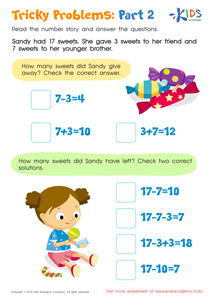Addition skills Grade 2 Adding up to 1000 Worksheets
5 filtered results
-
From - To
Boost your second grader's math confidence with our engaging "Addition Skills Grade 2 Adding up to 1000 Worksheets." These worksheets are expertly crafted to help young learners practice and master addition of numbers up to 1000, laying a strong foundation for advanced arithmetic. Featuring a variety of problems, from simple sums to more challenging exercises, our printable sheets are designed to make learning interactive and enjoyable. Perfect for both classroom and at-home use, these resources will support your child's math journey, enhance their problem-solving abilities, and prepare them for future math success. Download today and watch their adding skills soar!
Parents and teachers should prioritize developing addition skills for second graders, especially those adding up to 1,000, as it forms a critical foundation for their future math proficiency and daily problem-solving abilities. At this age, children are transitioning from basic single-digit addition to handling more complex, multi-digit problems. Mastery in this area boosts their confidence and competence, helping them approach more advanced mathematical concepts with ease, such as multiplication, division, fractions, and eventually, algebra.
Moreover, fostering strong arithmetic skills enhances cognitive development, improving memory, attention, and logical thinking, which are essential for learning in all subjects. Beyond academics, addition is a practical life skill. From calculating expenses during shopping to understanding time management and measuring ingredients in recipes, addition is frequently used.
For parents and teachers, focusing on this skill helps ensure that children don’t develop math anxiety, maintaining a positive attitude towards the subject. Engaging children in fun, practical activities like counting money, playing math-based games, and solving real-world problems can make the learning process enjoyable and meaningful. Overall, solid addition skills are a stepping stone to lifelong numerical literacy and critical thinking.



















